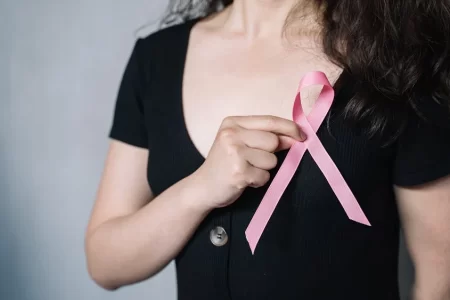Escaping the Breast Cancer: Different Ways to Cope a Breast Cancer Diagnosis
- Updated on: Jul 29, 2024
- 4 min Read
- Published on Nov 16, 2020

Breast Cancer: Emotions & Feelings
According to the Centers for Disease Control and Prevention, one out of eight women get diagnosed with breast cancer. Approximately 2.5 million women annually get diagnosed with breast cancer in the United States. Because the majority of them have no family history of breast cancer or other known risk factors, the diagnosis often comes as a devastating surprise. The emotional turmoil because of this unfortunate surprise, can affect women’s physical health and psychological well-being. Breast cancer can bring up a wide range of feelings you’re not used to dealing with. It may also intensify existing feelings. These feelings may change daily, hourly, or even minute to minute. These feelings are all normal, whether you’re currently in treatment or done with treatment.
During your treatment, you may find yourself crowded by many different emotions. A lot of women get overwhelmed by these emotions. As a natural response, some amount of anxiety, depression, and fear is all normal when breast cancer is a part of your life with a certain amount of distress as well. However, some women are more affected than others. But each of them can benefit from help and support from other people, whether family and friends, support groups, religious groups, professional counsellors, or others.
The emotional issues do not stop after the treatment as well. For example, after a treatment course or procedure, you may be concerned about breast cancer recurrence. By this time, you may be more aware of the effects cancer has had on your family, friends, and career. You may cultivate a new look at your relationships with those around you. Some unexpected issues might also cause concern, such as financial stress resulting from your treatment. These all can make you anxious.
Many things can cause these feelings, not limited to physical symptoms such as pain, nausea, or extreme tiredness. Many women go under breast cancer surgery, and body image changes can affect their self-esteem and confidence. You may also fear death, suffering, pain, or all the unknown things that lie ahead.
For women diagnosed with breast cancer, their friends and family can feel distressed after the diagnosis and even several years after the cancer is treated. However, as the cancer situation changes, you must prepare yourself to cope with new stressors and the old.
Read About What Is Breast Cancer (Female)?
What Are the Reactions to a Breast Cancer Diagnosis?
How do you feel after your breast cancer diagnosis is individual to you and may vary from others, but how you think about and cope with cancer is often affected by the values you have been raised. For example, some people:
- Feel they have to be strong.
- Seek support from loved ones and other cancer survivors.
- Ask for help from professionals and counsellors.
What Are the Issues You May Counter After Being Diagnosed With Breast Cancer or Treatment?
There is a range of feelings and emotions you may get exposed to when you are first diagnosed with breast cancer, which may include:
- Overwhelmed – feeling of life getting out of control
- Denial – trouble believing or accepting the diagnosis
- Anger
- Fear and worry
- Hope
- Stress and anxiety – both during and after treatment
- Sadness and depression
- Guilt – blaming yourself for the disease
- Loneliness
- Gratitude
Many women face additional stressful issues. For example, you may be stressed due to the changed appearance due to breast cancer surgery. You may also be concerned about sexuality after breast cancer. This issue is even more stressful for younger breast cancer survivors.
For some women, chemotherapy results in early menopause, which can be quite frustrating on its own. Some women might think of starting a family or have more children and might worry about the treatment’s effects. However, you should always remember that regardless of the changes you experience, there is advice and support to help you cope with your breast cancer.
What Are the Various Ways to Cope With Your Emotions?
Coping with breast cancer or with any illness can be draining and stressful. Here are some tips which can help you to manage life with and after breast cancer.
Express Your Feelings – Keep the Lines of Communication Open
When you express strong feelings like anger or sadness, you are more likely to let go of them. Some people vent out their feelings by talking to friends or family, other cancer survivors, a support group, or a counsellor. However, if you can’t prefer to discuss your cancer with others, you can still choose to sort out your feelings, writing them down, or thinking about them.
You should try to maintain honest and two-way communication with your loved ones, doctors, and others after your breast cancer diagnosis. You will feel isolated if you try to put up a strong front. By expressing emotions honestly to your loved ones, you can all gain strength from each other.
Anticipate Possible Physical Changes
When your breast cancer has been diagnosed, and you are on your way to starting the treatment, it is the best time to plan for changes. You should prepare yourself now so that you’ll be able to cope later with ease.
Ask your healthcare provider about your treatment’s possible risk and side effects and what changes you should anticipate to your body. For example, if the drugs will cause hair loss or how a breast cancer surgery can impact your body image. Will you need to use prosthetics after breast cancer surgery?
Look for the Positive
You should look for the good even in a bad time and try instead of thinking the worst. You should behopeful. You should use your energy to focus on your well-being and what you can do now to stay as healthy as possible.
Don’t Blame Yourself for Your Cancer
Some women blame themselves for their breast cancer and believe it happened to them because of something they did or did not do. You should remember that cancer can happen to everyone. You should try to get out of this guilt.
Be as Active as You Can
You should try to be physically active. It can help you distract your concentration on other things besides cancer and the worries it brings. You should also try some exercise, gentle yoga and stretching, which might be useful for this cause.
Look for Things You Enjoy
You may like hobbies such as reading, photography, woodworking or crafts, or find some art, movies or music which makes you happy.
Apart from the above suggestions, you can follow these tips to cope with your breast cancer
- Don’t try to put yourself upfront if you don’t feel to
- You choose when you talk about your cancer to others
- Find ways to help relax whatever activity it maybe
- Look at those things only which are under your control
- Try to maintain your normal lifestyle
- Review your goals and priorities
- Let family and friends help you
- Talk about your finances and if you need any help, friends, and family
- Fight stigma and let people know that they shouldn’t feel afraid around you
- Develop your own coping strategy according to the need of your body comfort












